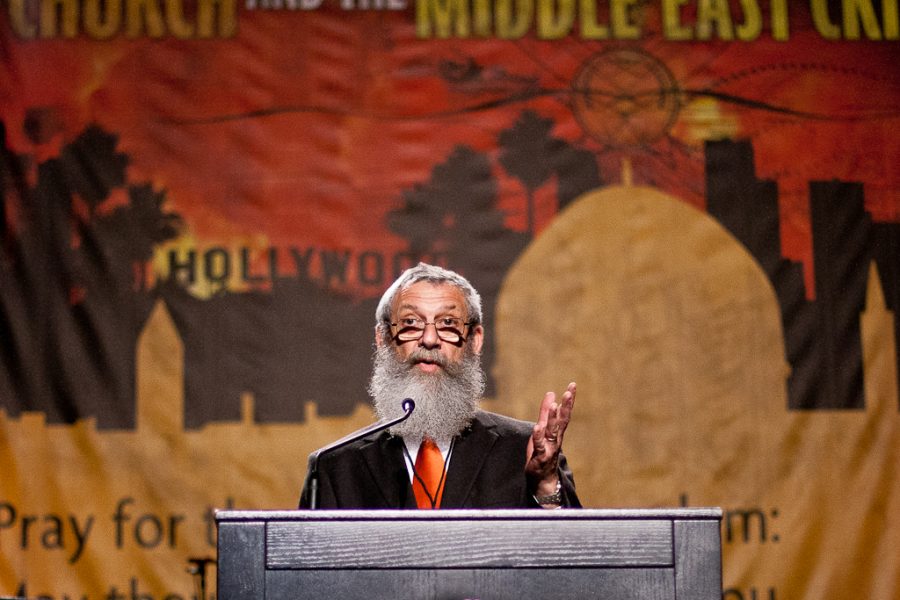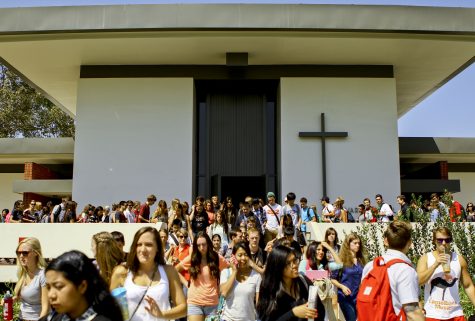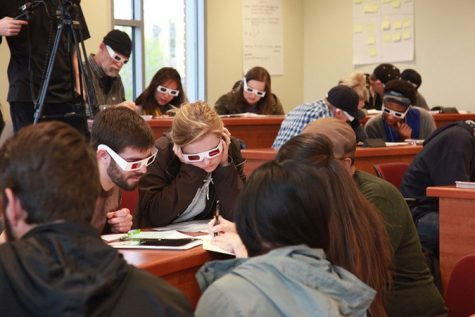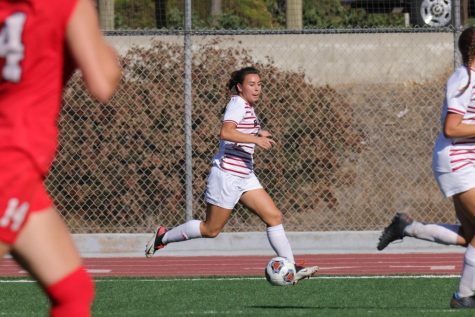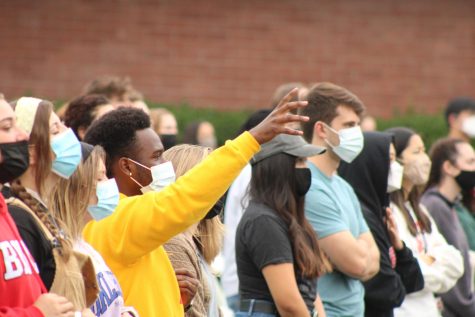Middle East Crisis conference offers chance for cross cultural interaction
Speakers cover an array of topics concerning Israel and the Church at the Middle East Crisis conference.
Overseer of Chosen People Ministry in Israel, Michael Zinn, speaks to the audience during the Israel, the Church, and the Middle East Crisis Conference on March 23, 2012. | Katie Juranek/THE CHIMES
March 27, 2012

| Katie Juranek/THE CHIMES
“We are in a war. God’s got the assignment for us today. Are we going to obey?” Joel Rosenberg asked the approximately 2,100 people who filled Chase Gymnasium for the Israel, the Church, and the Middle East Crisis conference.
The conference, hosted by Chosen People Ministries, gave Biola students the chance to interact with believers from other cultures beyond the standard evangelical sphere. Some women in attendance had their heads covered with tallits, or prayer shawls, and some of the men wore yamakas as they attended the Friday session at the beginning of the Jewish Sabbath.
“The conference was timely and relevant geopolitically, economically and theologically. The only disappointment was that it was not well-attended by current Biola students. The ongoing instability in the Middle East impacts us all irrespective of college major, ministry interests or vocational aspirations,” said senior social sciences major Desiree LaChapelle.
Friday speakers discuss Holocaust and end times
The two-day conference began Friday night and featured Marty Goetz, whom Dennis Dirks, dean of Talbot, referred to as “the modern day psalmist.” Goetz sang both traditional and original psalms in English and Hebrew.
The worship leader for Harvest Christian Fellowship followed with contemporary worship. Steve Wiggins and his wife and son led worship with three Arab Christians. Since Wiggins and his son are Jewish, the very makeup of the band emphasized that there is a possibility of reconciliation between Jews and Arabs, according to Wiggins.
Also Friday night, Michael Zinn, a Russian Messianic Jew and overseer of Chosen People Ministries in Israel, shared his testimony as well as the testimony of his father. His father is a Holocaust survivor. Zinn said that his father had a very vivid memory of the concentration camps. He recalled being beaten by two German Nazis — one would sit on his neck while the other would beat him. The soldier on his neck wore a cross that would dangle in front of Zinn’s father’s face during the beatings. During Hitler’s regime, many of the Nazis called themselves Christians. Thus Zinn’s father, like many other Jews who survived the Nazis, have a very unfavorable view of Christians and want nothing to do with Jesus, Zinn explained.
Rosenberg followed and spoke of his current theory about end time prophecy. According to him, Ezekiel 38 and 39 have a chance of coming to pass as soon as this year with Israel threatening Iran and Vladimir Putin reelected in Russia.
Saturday covers Christianity to Muslims and Jews
On Saturday morning, Walter Kaiser, president emeritus and distinguished professor of Old Testament at Gordon-Conwell College Theological Seminary took the conference attendees through a brief history of Israel’s occupiers. He then focused his attention on the turning points of the end times and future worship of Jesus by Arabs in Egypt.
Rosenberg subsequently spoke about how God is working in the lives of Muslims through media and revelations from the Holy Spirit. He quoted Joel 22:28 and Acts 2 where God talks about pouring out his Spirit in the last days. Rosenberg said that people in the Middle East tend to have visions and dreams of Jesus, and this is how God is calling them to himself.
“Maybe the reason Jesus said he would pour out his Spirit in the last days was because the church has done a horrible job [spreading the gospel],” Rosenberg said. “Sometimes we need to share the gospel with someone who will look like they won’t say yes.”
This was the perfect introduction for the testimony of the president of Iran Alive Ministries, Hormoz Shariat. He described how he is working for spiritual freedom in Iran.
“The ability to open the Bible, the ability to even question Islam, is spiritual freedom,” Shariat said.
He explained the importance of ministering and evangelizing to Muslims.
“When you reach out … to devout Muslims, and they come to Christ, they become devout Christians,” he said.
Mitch Glaser, president of Chosen People Ministries, spoke Saturday morning as well. Rosenberg had joked that Glaser would give his prediction for the exact day of Jesus’ second coming. Instead, Glaser gave a list of things that would have to occur before the second coming. First, the Israelites would have to be in the land God had promised them, fulfilling Ezekiel 37. Second, Jerusalem would have to be in Jewish hands. Third, Israel would need to be surrounded by enemies, fulfilling Ezekiel 38. He said that while waiting for Christ’s return, it is the Gentile’s job to make the Jews jealous for salvation, according to Romans 11. It is the Jewish people’s job is to evangelize to fellow Jews about the Messiah who has already come.
Sessions include variety of topics
Following the speakers were a series of breakout sessions dealing with various topics from reaching Muslims for Jesus to the role of the church in relation to Israel.
After worship with Goetz and later Wiggins, Rosenberg closed the Saturday evening session saying, “Folks, don’t be intimidated by us [Jews]. We don’t have a special deal to get into heaven. We have the same deal you have. You are not doing us any favors by not talking about Jesus.”


